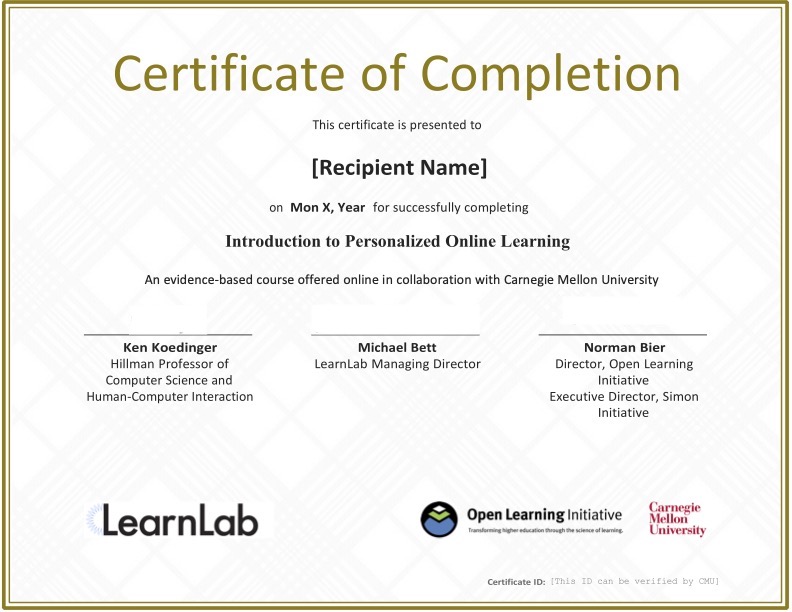Adaptation, Crowdsourcing, and Persuasion
This course will help you:
- Learn practical skills with core principles for designing, improving, and evaluating tools for online learning
- Appropriately use adaptive techniques in online tools to improve student learning
- Apply learnersourcing techniques to improve iteratively improve educational designs
- Apply persuasive techniques to encourage learning on topics that students are reluctant to learn
Start Any Time
Work at your own pace and you will have instructors available to help you answer any questions.
Duration
Approximately 3 weeks, 6-8 hours/week
Fee
$1500 - Professional Rate
$500 - Full-time Student Rate
*Proof of full time student enrollment required. Acceptable forms of id include a letter from your university’s registrar office or an unofficial transcript. Email your documents to learnlab-help@lists.andrew.cmu.edu
Certificate Course Description
This course will cover three advanced techniques that can be applied to designing, improving and evaluating tools for online learning.
First, we describe adaptivity and how tools can use it to improve learning. We will define what we mean by adaptivity, common types of adaptivity, why we need it, and the information that helps guide us to make adaptive design decisions
Second, we will discuss where data and direct learner feedback is useful. We will then dive into a form of crowdsourcing known as learnersourcing to examine ways we can improve instruction through the interactions of our learners.
Finally, we will examine ideas behind embedded persuasive design. Topics will include the notion of reactance as well as sneaky learning in order to teach topics that students are reluctant to learn about.
Our team hosts office hours for all courses over Zoom on the 2nd and 4th Wednesday of each month, 10:00 AM – 11:00 AM EDT/EST (4:00 PM – 5:00 PM CAT). On 2nd Wednesdays, Dr. Ken Koedinger, who is the Director of the Masters of Educational Technology and Applied Learning Sciences (METALS) program, will be available. On 4th Wednesdays, you will have the opportunity to speak with our learning engineers.
Module 1: Models of Adaptation
- Define adaptivity and articulate the need for it
- Describe what information is useful to make adaptive decisions
- Distinguish between the four common types of information used for adaptive design
- Distinguish between the three common types of adaptivity and the benefits and tradeoffs of each
Module 2: Crowdsourcing
- Distinguish between scenarios where learner feedback about instruction is or is not informative
- Articulate the design pattern of learnersourcing, and how it can improve instruction
- Describe the benefits of learnersourcing in comparison to iterative instruction design
Module 3: Persuasion
- Define reactance and how it might manifest in a learning tool
- Identify learning objectives where explicit instruction is unlikely to be effective
- Describe approaches to make instruction less explicit while still effective
Module 4: Course Project
At the end of the course, you’ll have an opportunity to do a project where you will design and create a simple prototype of a learning tool to demonstrate interactions that apply principles you’ve learned in the course. This will provide you with an experience applying the fundamentals you will learn in the modules to a larger, more authentic, context. It will be graded and you will receive personalized feedback.
Foundations for Online Tool Design
The course project allows some opportunity for advanced technical prototyping skills, but this course will allow for less technical prototypes.
Researchers, product/UX designers, instructional designers, or anyone interested in educational technology wanting to learn about, design, and create tools for effective instruction.
Course Instructors

Dr. Chinmay Kulkarni
is an associate professor of Human-Computer Interaction at Carnegie Mellon University. His research focuses on building technology that uses the networked properties of online communities to improve how people live and learn. His work combines design techniques, AI models, and research on learning to create learning systems that work at scale. This research has already helped 100,000+ students from 130+ countries learn more effectively in MOOCs, and has advanced the science of learning.
Certificate
Upon successful completion of the program, participants will receive a verified digital certificate of completion from Carnegie Mellon University’s Open Learning Initiative.

In addition to the knowledge and immediately applicable frameworks you will gain by attending your selected courses, you will benefit from:
- A digital, verified version of your Executive Certificate (Smart Certificate) you can add to your resume and LinkedIn
- Networking with a global group of your peers and instructors for advancing your career
Register Here:
Enter your email address:
For this course, copy the course key: TFOL4-001
Click on this link: Carnegie Mellon University’s Open Initiative
Paste the course key in the text box labeled “Course Key:”
Register and try out the course for 48 hours before payment is due.
If needed, watch this video on how to register in OLI:
Optional additional step but highly recommended:
Set OLI to automatically resume from where you left off in the course:
1) Click on your name in the upper right corner to bring up your OLI profile settings.
2) Change the option on the dropdown to “Yes, always resume automatically.”
3) Lastly, select “UPDATE”.


